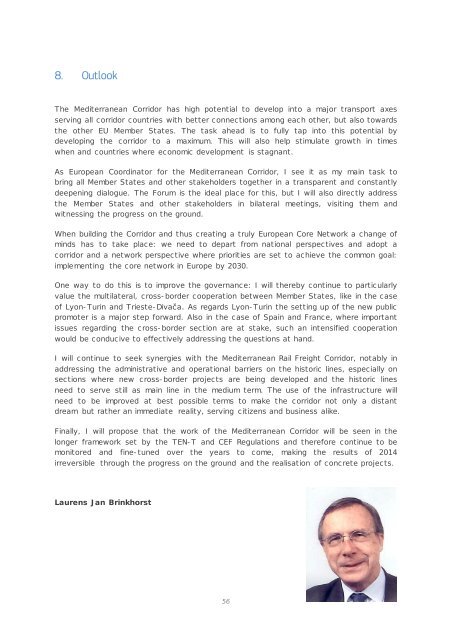Mediterranean
5Lwz6ndOG
5Lwz6ndOG
Create successful ePaper yourself
Turn your PDF publications into a flip-book with our unique Google optimized e-Paper software.
8. Outlook<br />
The <strong>Mediterranean</strong> Corridor has high potential to develop into a major transport axes<br />
serving all corridor countries with better connections among each other, but also towards<br />
the other EU Member States. The task ahead is to fully tap into this potential by<br />
developing the corridor to a maximum. This will also help stimulate growth in times<br />
when and countries where economic development is stagnant.<br />
As European Coordinator for the <strong>Mediterranean</strong> Corridor, I see it as my main task to<br />
bring all Member States and other stakeholders together in a transparent and constantly<br />
deepening dialogue. The Forum is the ideal place for this, but I will also directly address<br />
the Member States and other stakeholders in bilateral meetings, visiting them and<br />
witnessing the progress on the ground.<br />
When building the Corridor and thus creating a truly European Core Network a change of<br />
minds has to take place: we need to depart from national perspectives and adopt a<br />
corridor and a network perspective where priorities are set to achieve the common goal:<br />
implementing the core network in Europe by 2030.<br />
One way to do this is to improve the governance: I will thereby continue to particularly<br />
value the multilateral, cross-border cooperation between Member States, like in the case<br />
of Lyon-Turin and Trieste-Divača. As regards Lyon-Turin the setting up of the new public<br />
promoter is a major step forward. Also in the case of Spain and France, where important<br />
issues regarding the cross-border section are at stake, such an intensified cooperation<br />
would be conducive to effectively addressing the questions at hand.<br />
I will continue to seek synergies with the <strong>Mediterranean</strong> Rail Freight Corridor, notably in<br />
addressing the administrative and operational barriers on the historic lines, especially on<br />
sections where new cross-border projects are being developed and the historic lines<br />
need to serve still as main line in the medium term. The use of the infrastructure will<br />
need to be improved at best possible terms to make the corridor not only a distant<br />
dream but rather an immediate reality, serving citizens and business alike.<br />
Finally, I will propose that the work of the <strong>Mediterranean</strong> Corridor will be seen in the<br />
longer framework set by the TEN-T and CEF Regulations and therefore continue to be<br />
monitored and fine-tuned over the years to come, making the results of 2014<br />
irreversible through the progress on the ground and the realisation of concrete projects.<br />
Laurens Jan Brinkhorst<br />
56



